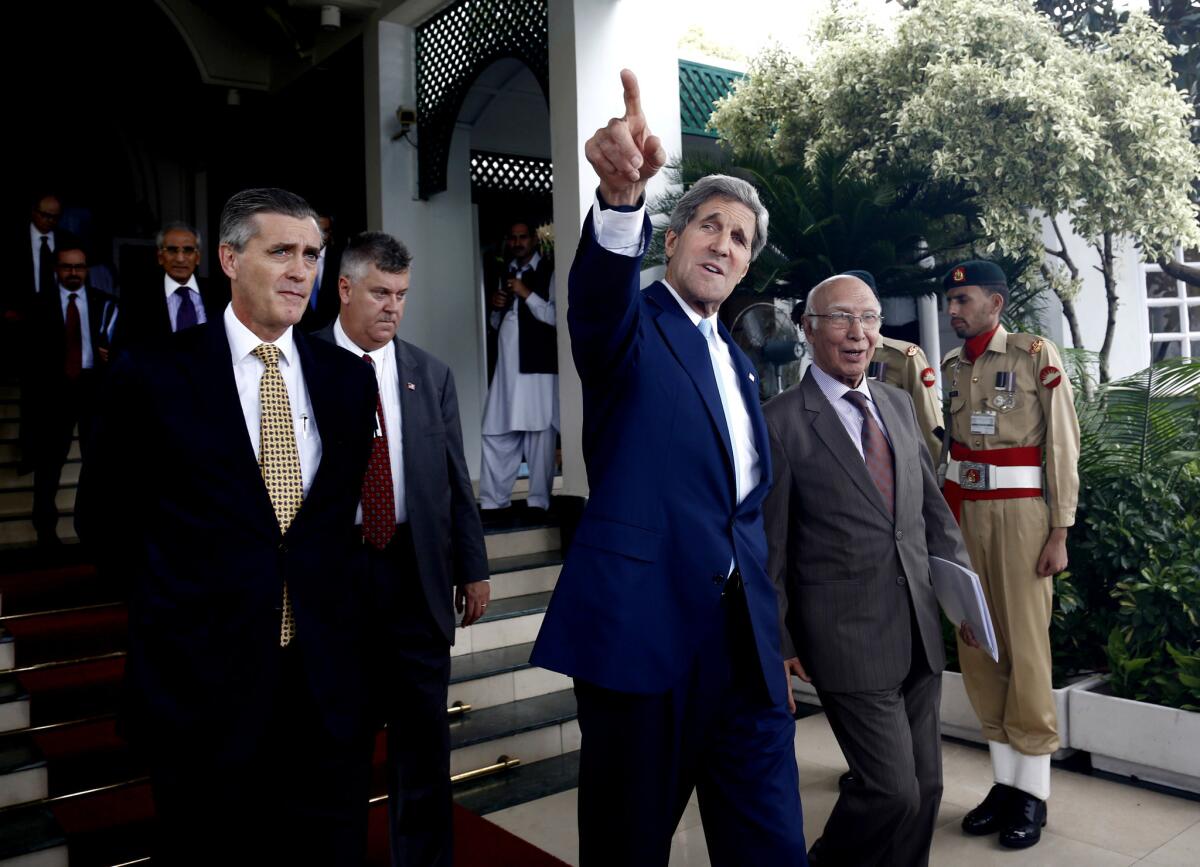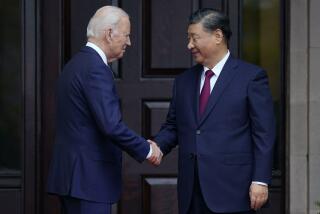U.S., Pakistan agree to revive high-level talks

ISLAMABAD, Pakistan — The U.S. and Pakistan will revive high-level talks on a host of issues including counterterrorism cooperation and preventing militancy along the Afghan-Pakistani border, and economic revitalization in the nuclear-armed South Asian nation, Secretary of State John F. Kerry announced Thursday after meeting with Pakistan’s new civilian leadership.
Those negotiations, known to both countries as their “strategic dialogue,” had been on hold since 2011, when relations between Islamabad and Washington veered toward collapse. During that year, Pakistan’s top civilian and military leaders had been angered by a CIA contractor’s killing of two Pakistanis, the secret U.S. raid that killed Al Qaeda leader Osama bin Laden, and American airstrikes along the Afghan border that mistakenly killed 24 Pakistani soldiers.
However, since Nawaz Sharif’s return to power this spring, Pakistan has signaled an interest in rebuilding its tenuous partnership with the U.S. Twice a prime minister in the 1990s, Sharif led his party to an overwhelming victory in national elections this spring and was elected prime minister by lawmakers in early June.
“Today, very quickly, we were able to agree to a resumption of the strategic dialogue to foster a deeper, broader and more comprehensive partnership between our countries,” Kerry said at a press conference in Islamabad with his Pakistani counterpart, Sartaj Aziz. “The relationship is not defined simply by the threats we face. It is not only a relationship about combating terrorism. It’s about supporting the people of Pakistan and helping, at this critical moment, Pakistan’s economic revival.”
At the same time, Kerry cautioned Pakistan that it must do more to clamp down on militant groups that have killed thousands of civilians across the country in recent years. Since Sharif took office in June, militant attacks have claimed the lives of more than 150 people. Over the years, critics have accused Sharif of being soft on extremist groups, and his calls for dialogue with militants has only heightened doubts about his strategy to combat terrorism.
“The choice for Pakistan is clear: Will the forces of violent extremism be allowed to grow more dominant, eventually overpowering the moderate majority?” Kerry said. “I ask anybody in Pakistan to ask themselves, how many bridges have those terrorists offered to build? How many schools have they opened? How many economic programs have they laid out for the people?”
Kerry’s agenda included meetings with Sharif, Aziz and other top civilian and military leaders. While both Kerry and Aziz said their two countries were making headway in their bid to forge stronger ties, key security issues continue to cloud the relationship. At the top of the list is Pakistan’s opposition to Washington’s longstanding drone missile campaign.
The U.S. has relied heavily on drone missile strikes to erode Al Qaeda’s ability to plan and carry out attacks against Western targets. Since Obama took office in January 2009, the U.S. has carried out nearly 300 drone strikes in northwest Pakistan, according to the Long War Journal websites, which tracks drone strike statistics.
However, Pakistanis view the drone program as a blatant violation of their country’s sovereignty, and argue that it has become a major recruiting tool for militants because of the inordinate number of civilians mistakenly killed in the strikes.
Pakistani leaders welcomed Obama’s speech in May outlining restrictions in the drone program that would reduce the number of strikes. But in mid-July, Sharif’s interior minister, Chaudhry Nisar Ali Khan, warned that the continuation of Washington’s drone program could lead to “a direct standoff” and suggested Pakistan could balk at allowing the U.S. to use its highways for the withdrawal of troops and equipment from Afghanistan at the end of 2014.
Aziz said he repeated Pakistan’s opposition to the drone campaign during his meeting with Kerry. Asked if Pakistan was seeking a curtailment of drone strikes, Aziz said, “We are asking for stopping the drones, not curtailment.”
Kerry and Pakistani leaders also discussed the country’s role in facilitating peace talks between the Afghan Taliban, the U.S. and Afghan President Hamid Karzai. Historically Pakistan has been viewed as an impediment to peace in Afghanistan, with many in Kabul and the West accusing Pakistan’s powerful security establishment of actively supporting Afghan insurgent activity in recent years.
However, in the last few weeks Islamabad has appeared more receptive to fostering negotiations between the Afghan government and the Taliban’s top leadership, which is based in Pakistan’s southern city of Quetta. Taliban leaders maintain strong ties with Pakistan’s security establishment, a relationship that dates back to the Afghan mujahedin struggle against Soviet occupation in the 1980s.
Kerry lauded Pakistan for being “very helpful” in attempting to get Taliban leaders to join peace talks, though the militants so far remain reluctant to negotiate with Karzai. At the same time, Kerry urged Islamabad to do more to prevent Afghan insurgent groups like the Haqqani network from using Pakistan’s tribal badlands as safe havens from which to launch cross-border attacks on Afghan and U.S. forces.
Kerry’s visit was his first to Pakistan since the new Sharif administration took power. During his meeting with Sharif, he invited the new prime minister to meet Obama in Washington sometime in the fall.
ALSO:
House votes for new tough sanctions against Iran
U.S. gun laws blamed for worsening Latin American violence
U.N. team to probe sites of reported Syrian chemical weapons use
More to Read
Start your day right
Sign up for Essential California for news, features and recommendations from the L.A. Times and beyond in your inbox six days a week.
You may occasionally receive promotional content from the Los Angeles Times.






